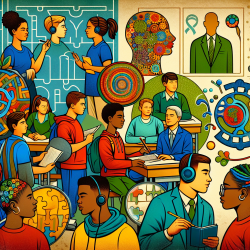Introduction
The increasing survival rates of cancer patients have ushered in a new era of healthcare needs, particularly in the realm of community-based rehabilitation. The study "Developing Community-Based Rehabilitation for Cancer Survivors: Organizing for Coordination and Coherence in Practice" provides valuable insights into the challenges and strategies for effective rehabilitation services. This blog will explore how practitioners can enhance their skills by implementing these findings or by pursuing further research.
Key Findings from the Research
The research conducted in Denmark highlighted several key issues in the coordination and coherence of community-based cancer rehabilitation:
- Lack of Shared Culture: A primary barrier to effective collaboration among healthcare providers was the absence of a shared culture and delivery system.
- Importance of Multidisciplinary Teams: The establishment of formal multidisciplinary steering committees and team-based organizations was crucial for developing coordination and coherence.
- Informal Relationships: Informal relationships among healthcare providers played a significant role in facilitating coordination and coherence.
Implementing Research Outcomes
Practitioners can enhance their skills and improve rehabilitation outcomes by focusing on the following strategies:
- Fostering a Shared Culture: Encourage the development of a shared culture among healthcare providers by organizing regular interdisciplinary meetings and workshops.
- Establishing Multidisciplinary Teams: Form multidisciplinary teams to ensure a holistic approach to rehabilitation, integrating biomedical and psychosocial interventions.
- Building Informal Networks: Leverage informal relationships and networks to enhance communication and collaboration across different healthcare sectors.
Encouraging Further Research
While the study provides valuable insights, there is a need for further research to address the following areas:
- Cross-Cultural Studies: Investigate how cultural differences impact the coordination and coherence of rehabilitation services in diverse settings.
- Longitudinal Studies: Conduct longitudinal studies to assess the long-term impact of coordinated rehabilitation services on cancer survivors' quality of life.
- Technological Integration: Explore the role of technology in enhancing coordination and communication among healthcare providers.
Conclusion
By implementing the outcomes of this research, practitioners can significantly enhance the coordination and coherence of community-based rehabilitation services for cancer survivors. This, in turn, will lead to improved health outcomes and quality of life for patients. To read the original research paper, please follow this link: Developing community-based rehabilitation for cancer survivors: organizing for coordination and coherence in practice.










